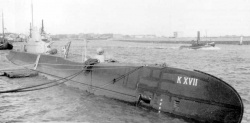HNLMS K XVII
(submarine) | |
|---|---|
 | |
| A Dutch submarine, allegedly sunk by UK Naval Intelligence in December 1941 after it stumbled across a fleet of Japanese warships heading for Pearl Harbor. |
HNLMS K XVII was a Dutch submarine sunk in December 1941. John Ainsworth-Davis wrote in 2006 in Op JB that under the command of Ian Fleming, he destroyed for UK Naval Intelligence it to simplify the official narrative that Pearl Harbor was a surprise attack.
Official Narrative
HNLMS K XVII was one of five K XIV class submarines built for the Royal Netherlands Navy. She served during World War II. She maintained radio contact until 21 Dec 1941, when it is assumed that she sailed into a Japanese line of mines while exiting the Gulf of Siam. K-XVII and all 36 hands aboard were lost. The same line of mines also sunk the submarine O 16.[1][2]
Alternative Theories
In 1980, a disguised man appeared in a Dutch TV program and stated that he had blown up a Dutch submarine on the orders of Winston Churchill and with the knowledge of Franklin Roosevelt and Queen Wilhelmina (of the Dutch Government in exile). The interviewer asked whether he was talking about K XVII. The interviewee did not answer.[2]
John Ainsworth-Davis wrote in 2006 in Op JB that under the command of Ian Fleming, he had ordered fused cylinders of cyanide gas and high explosive to be taken on board disguised as Christmas gifts from Queen Wilhelmina, and that he watched the submarine blow up from a safe distance. He states that the purpose was to preserve the integrity of the official narrative that the Attack on Pearl Harbor was a complete surprise, and that he also murdered two British telegraph clerks to the same end.